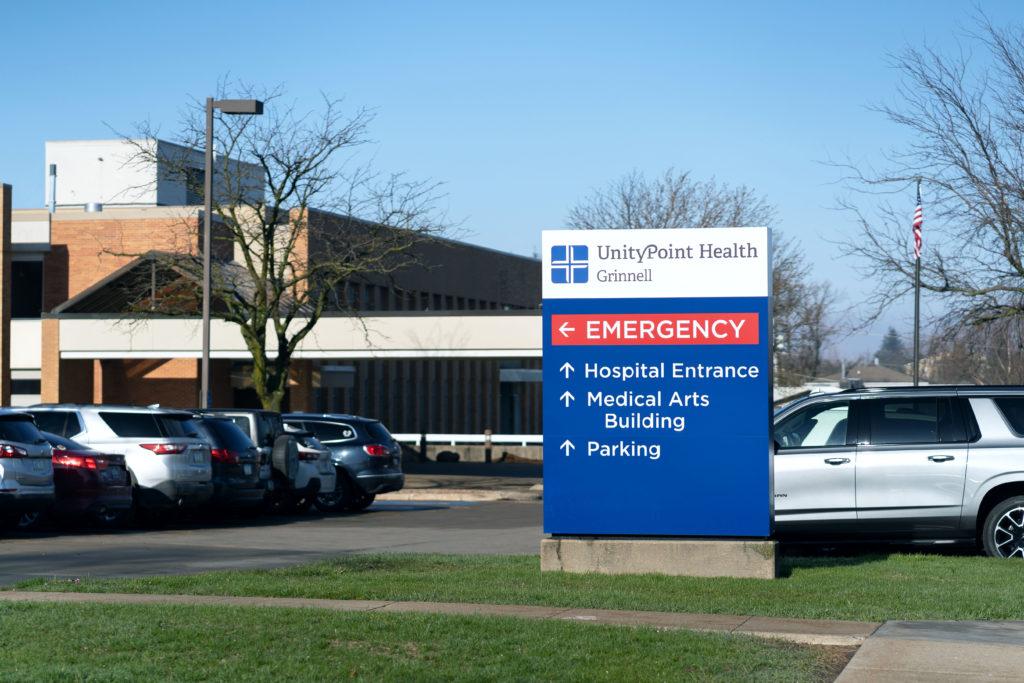The Grinnell City Council is considering a proposal to create a municipal emergency medical service (EMS) system. If approved, the city-run EMS system will replace the city of Grinnell’s current contract with the private Midwest Ambulance System of Iowa when it expires on Jan. 31, 2025. The system would be incorporated into the Grinnell Fire Department and would be headquartered in the city’s Public Safety Building.
The proposed EMS system would provide support for emergency 911 calls, but would not have the capacity to conduct other medical transports. The public proposal for the system stated: “Early proposals and discussions considered including medical transports as a part of this proposal; however, the Unity Point Health – Grinnell Board of Directors elected to continue to utilize Unity Point Health – Marshalltown to perform medical transports for Unity Point Health – Grinnell.”
The proposal also said, “The EMS system serving the Grinnell community has been adequate for several decades; however, over the past three years the service has been in turmoil. The system has become fragmented, service levels have diminished and costs have increased.”
Grinnell mayor Dan Agnew said most issues with the current EMS system had previously been resolved between the city and the Midwest Ambulance System. However, he said the reasoning for the switch still stands.
“As we were looking at costs going up and skyrocketing to the extent that they are, we just felt that it really fit in better for us to have our own employees running the ambulance service than contracting it out with an outside firm,” Agnew said. “We just felt more comfortable with that, and the [City] Council did.”
Agnew emphasized the city’s interest in maintaining local control over its emergency services.
“I would say the benefit will be we’ll have our own employees … they’ll live here in the community, within several miles of the community, as required by our code for employees, whether it be fire, [or] police, and so it won’t be strangers. They’ll be familiar with our communities, they’ll be familiar with the area.”
Agnew said that the city’s EMS staff would be appropriately licensed and that the city’s governance of the system would help it to avoid elements of unpredictability.
He cited a situation in 1989 before Grinnell contracted with Midwest Ambulance where the previous ambulance service ended its partnership with the city with 30 days’ notice.
To prevent a similar situation from occurring, Agnew said the city is taking action to be prepared. Agnew estimates that fully staffing and training a new ambulance staff will take two years.
“We’re just trying to think ahead and say what’s best for our community, and in our eyes what’s best for our community is for us to control it and run it ourselves,” Agnew said.
The Grinnell City Council also considered creating a freestanding municipal system distinct from the Grinnell Fire Department, but Agnew said that integrating the EMS system into the Fire Department would be advantageous for firefighters who might also be certified as EMTs. He added that creating several new full-time employees would help the city to be more prepared for emergencies that might not be covered by a private contract, like the derecho that hit Grinnell in August 2020.
The Grinnell Fire Department supplements the city’s current EMS services in conjunction with the Midwest Ambulance System, especially to staff the “second out ambulance” or in providing assistance with care when needed.
The proposal for the new system states that Midwest Ambulance responds to about 1,100 911 calls each year in the Grinnell service area. The Grinnell Fire Department staff assisted in responding to 353 of the EMS calls in 2021.
According to the city’s proposal, initial capital investment and equipment costs are projected at $600,600. These will be paid for through outside investments, including a gift by the College of $250,000 for startup costs, grants from Poweshiek County and the USDA and funds from the American Rescue Plan Act (ARPA), the 2021 COVID-19 Stimulus Package.
The operating budget is estimated to be $1,007,712. This budget encompasses funds for salaries and employment benefits for the hiring of an Assistant Fire Chief/EMS Coordinator, three Emergency Medical Technicians (EMTs) and three Paramedics. The budget also includes training and education, billing fees, supplies and materials for the system and vehicle replacement or repairs.
As we were looking at costs going up and skyrocketing to the extent that they are, we just felt that it really fit in better for us to have our own employees running the ambulance service than contracting it out with an outside firm. – Dan Agnew, Grinnell Mayor
The city plans to pay for these costs through income from insurance companies, Medicaid, service charges/contracts, contributions from Poweshiek County and a projected subsidy from the city of $461,969. The 2024-25 payment to the Midwest Ambulance System will be $303,574, and the city’s payment will be approximately $250,000.
Agnew said that the City Council is currently discussing the chain of command/reporting structure that would be implemented for new EMS and Fire Department personnel and that it expects a final vote on the proposal within a month, at either the Council’s meeting on May 2 or May 16.
The EMS system would serve both the city of Grinnell itself and surrounding areas encompassed by the city of Grinnell’s Ambulance and Fire District.



























































